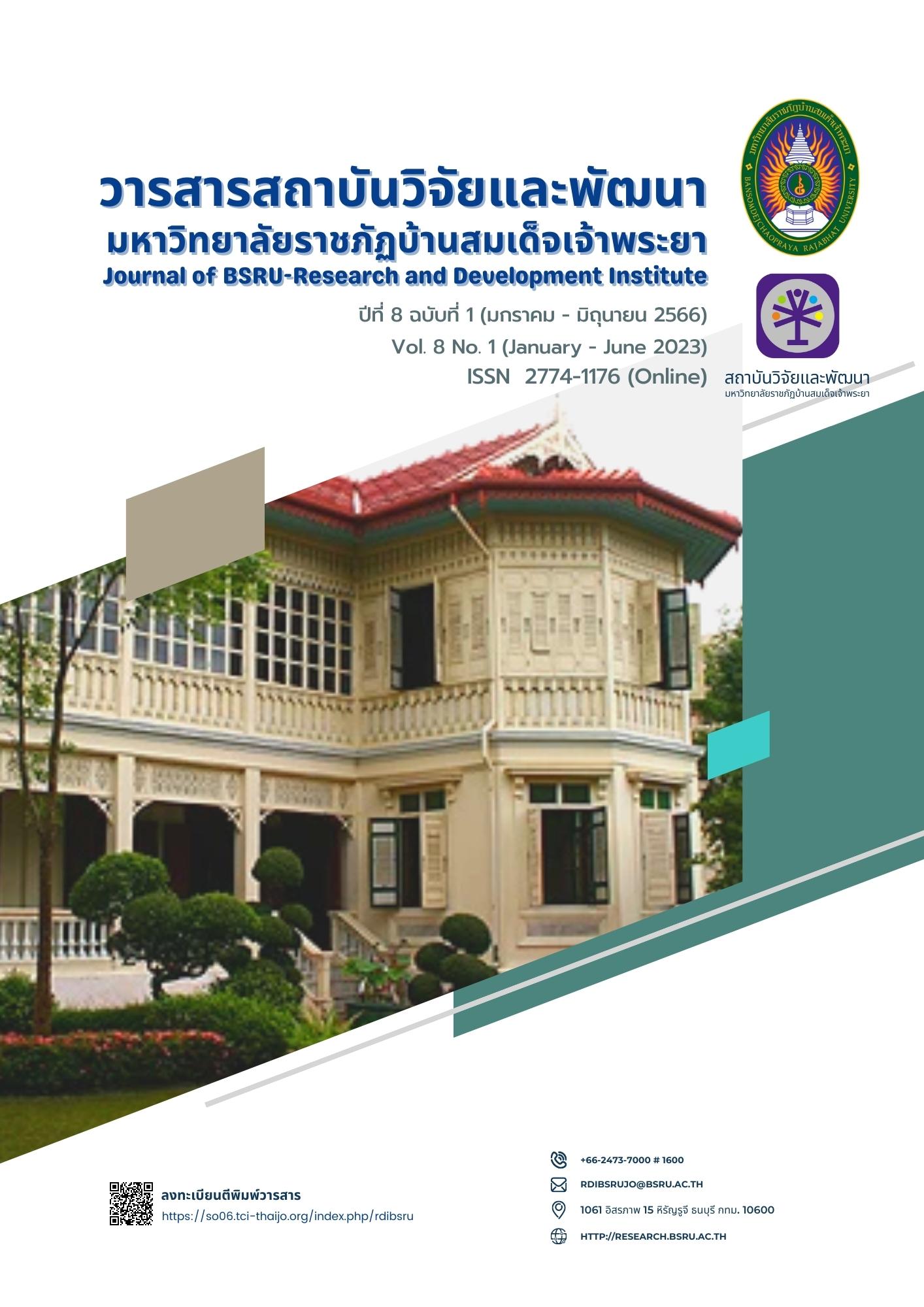การทดสอบอิทธิพลส่งผ่านของการเสริมพลังอำนาจทางจิตใจระหว่าง ภาวะผู้นำการเปลี่ยนแปลงและพฤติกรรมการเป็นสมาชิกที่ดีขององค์การ
คำสำคัญ:
ภาวะผู้นำการเปลี่ยนแปลง, การเสริมพลังอำนาจทางจิตใจ, พฤติกรรมการเป็นสมาชิกที่ดีขององค์การ, การวิเคราะห์โมเดลสมการโครงสร้างบทคัดย่อ
การศึกษานี้วัตถุประสงค์เพื่อทดสอบอิทธิพลส่งผ่านของการเสริมสร้างพลังอำนาจทางจิตใจต่อความสัมพันธ์เชิงสาเหตุระหว่างภาวะผู้นำการเปลี่ยนแปลงและพฤติกรรมการเป็นสมาชิกที่ดีขององค์การด้วยการวิเคราะห์โมเดลสมการโครงสร้าง กลุ่มตัวอย่างที่ได้จากการสุ่มคือพนักงานที่ปฏิบัติงานภาครัฐหรือภาคอุตสาหกรรมในเขตกรุงเทพมหานครและปริมณฑล จำนวน 305 คน เครื่องมือที่ใช้ในการวิจัยประกอบด้วยแบบสอบถามอิเล็กทรอนิกส์จำนวน 4 ส่วน ได้แก่ แบบสอบถามข้อมูลบุคคล แบบวัดภาวะผู้นำการเปลี่ยนแปลง แบบวัดการเสริมพลังอำนาจทางจิตใจ และแบบวัดพฤติกรรมการเป็นสมาชิกที่ดีขององค์การ เครื่องมือทั้งหมดมีความเที่ยงสูงโดยมีค่าระหว่าง 0.82 ถึง 0.94 การวิเคราะห์ข้อมูลด้วยความถี่ ร้อยละ ค่าเฉลี่ย ส่วนเบี่ยงเบนมาตรฐาน และการวิเคราะห์โมเดลสมการโครงสร้างด้วยโปรแกรมลาวาน
ผลการวิจัยพบว่า รูปแบบความสัมพันธ์เชิงสาเหตุระหว่างภาวะผู้นำการเปลี่ยนแปลงและพฤติกรรมการเป็นสมาชิกที่ดีขององค์การมีความสอดคล้องกับข้อมูลเชิงประจักษ์เป็นอย่างดี (Chi-Square=252, df=202, CFI=0.99, TLI=0.98, RMSEA=0.03, SRMR=0.04) ภาวะผู้นำการเปลี่ยนแปลงมีอิทธิพลทางตรงต่อการเสริมพลังอำนาจทางจิตใจ และการเสริมพลังอำนาจทางจิตใจเป็นตัวแปรส่งผ่านระหว่างความสัมพันธ์ของภาวะผู้นำการเปลี่ยนแปลงและพฤติกรรมการเป็นสมาชิกที่ดีขององค์การ ผลการศึกษาบ่งชี้ว่าภาวะผู้นำการเปลี่ยนแปลงมีอิทธิพลทางอ้อมแบบสมบูรณ์ต่อพฤติกรรมการเป็นสมาชิกที่ดีขององค์การผ่านการเสริมพลังอำนาจทางจิตใจ ผลการศึกษาให้ข้อมูลเชิงลึกเกี่ยวกับบทบาทของภาวะผู้นำการเปลี่ยนแปลงในการส่งเสริมพฤติกรรมการเป็นสมาชิกที่ดีขององค์การและอาจใช้เป็นสารสนเทศที่สำคัญในการพัฒนาโปรแกรมฝึกอบรมและพัฒนาภาวะผู้นำที่มีประสิทธิภาพ
Downloads
เอกสารอ้างอิง
Avolio, B. J., and Bass, B. M. (2004). Multifactor leadership questionnaire (MLQ) (3rd ed.). CA: Mind Garden.
Bass, B. M. (1985). Leadership and performance beyond expectations. New York: Free Press.
Bass, B. M., and Riggio, R. E. (2006). Transformational leadership (2nd ed.). NJ: Lawrence Erlbaum Associates.
Boomsma, A., and Hoogland, J. J. (2001). The robustness of LISREL modeling revisited. Structural equation models: Present and future. A Festschrift in honor of Karl Jöreskog, 2(3), 139-168.
Burns, J.M. (1978). Leadership. New York: Harper and Row.
Carless, S. A., Wearing, A. J., and Mann, L. (2000). A short measure of transformational leadership. Journal of business and psychology, 14(3), 389-405.
Hair, J. F., Black, W. C., Babin, B.J., and Anderson, R. E. (2018). Multivariate Data Analysis (8th ed.). London: Cengage.
Henderson, A. A., Foster, G. C., Matthews, R. A., and Zickar, M. J. (2020). A psychometric assessment of OCB: Clarifying the distinction between OCB and CWB and developing a revised OCB measure. Journal of Business and Psychology, 35(6), 697-712.
Kedcham, A. and Sattabut, T. (2022). Causal Relationship between Transformational Leadership, Teamwork and Teacher Job Satisfaction: Multilevel Structural Equation Modeling. Silpakorn Educational Research Journal, 14(1), 203-215. (In Thai).
Organ, D. W. (1988). Organizational citizenship behavior: The good soldier syndrome. London: Lexington books.
Saira, S., Mansoor, S., and Ali, M. (2020). Transformational leadership and employee outcomes: the mediating role of psychological empowerment. Leadership and Organization Development Journal, 42 (1), 130-143.
Samo, A. H., Shaikh, N., Mahar, F., Rizwan, S. I., and Jalil, S. (2022). Beyond The Call Of Duty For Health Practitioners: A Mediation And Moderation Model Of Leadership Styles, LMX, Empowerment And Organizational Citizenship Behavior. Webology, 19(3), 2533-2554.
Schreiber, J. B. (2017). Update to core reporting practices in structural equation modeling. Research in Social and Administrative Pharmacy. 13(3). 634-643.
Soper, D.S. (2021). A-priori Sample Size Calculator for Structural Equation Models. [Software][Online]. Retrieved from https://www.danielsoper.com/statcalc.
Spreitzer, G. M. (1995). Psychological empowerment in the workplace: Dimensions, measurement, and validation. Academy of management Journal, 38(5), 1442-1465.
Wandani, M., and Sunaryo, S. (2022). The Effect of Transformational Leadership on Turnover Intention and Organizational Citizenship Behaviour (OCB): The Mediation Role of Psychological Empowerment and Affective Commitment. International Journal of Economics, Business and Management Research, 6(9), 293-316.
Williams, L. J., & Anderson, S. E. (1991). Job satisfaction and organizational commitment as predictors of organizational citizenship and in-role behaviors. Journal of management, 17(3), 601-617.
ดาวน์โหลด
เผยแพร่แล้ว
ฉบับ
ประเภทบทความ
สัญญาอนุญาต
บทความ ข้อความ ภาพประกอบ และตารางประกอบที่ลงพิมพ์ในวารสารเป็นความคิดเห็นส่วนตัวของผู้นิพนธ์ กองบรรณาธิการไม่จำเป็นต้องเห็นตามเสมอไป และไม่มีส่วนรับผิดชอบใดๆ ถือเป็นความรับผิดชอบของผู้นิพนธ์เพียงผู้เดียว






